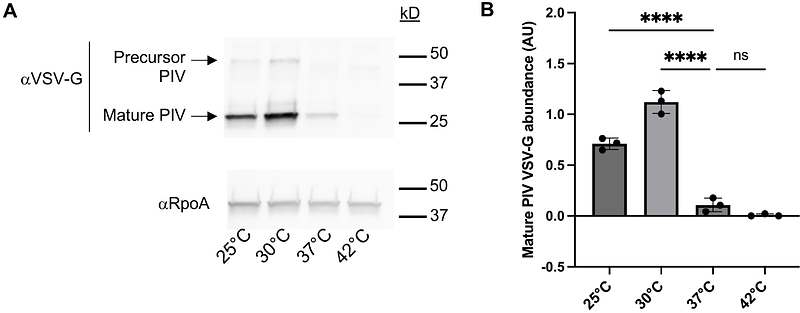LasR regulates protease IV expression at suboptimal growth temperatures in Pseudomonas aeruginosa

LasR regulates protease IV expression at suboptimal growth temperatures in Pseudomonas aeruginosa
Done, R.; Robertson, J.; Prezioso, S.; Goldberg, J. B.
AbstractThe opportunistic pathogen Pseudomonas aeruginosa causes debilitating lung infections in people with cystic fibrosis, as well as eye, burn, and wound infections in otherwise immunocompetent individuals. Many of P. aeruginosa\'s virulence factors are regulated by environmental changes associated with human infection, such as a change in temperature from ambient to human body temperature. One such virulence factor is protease IV (PIV). Interestingly, piv expression is higher at ambient temperatures (22-28 degrees C) compared to human body temperature (37 degrees C). We found that piv expression was thermoregulated at stationary phase, but not exponential phase, and that piv is thermoregulated at the level of transcription. Protein levels of known transcriptional regulators of piv, the quorum sensing regulator LasR and the gene-silencing histone nucleoid silencing proteins MvaT/MvaU, were not thermoregulated. Using a transcriptional reporter for piv, we show that LasR activates piv expression at stationary phase at 25 degrees C but not 37 degrees C, while MvaT/MvaU are not required for piv thermoregulation. We also identified a las box in the piv promoter, which is important for piv thermoregulation. We propose that LasR directly regulates piv at stationary phase at 25 degrees C but has a negligible impact at 37 degrees C. Here, we show that piv is uniquely regulated by LasR in a temperature-dependent manner. Our findings suggest that the LasRI quorum sensing regulon of P. aeruginosa may not be fully characterized and that growth at non-standard laboratory conditions such as lower temperatures could reveal previously unrecognized quorum sensing regulated genes.


